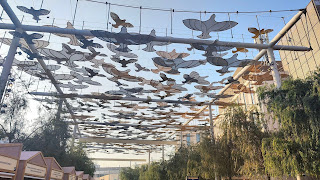Bridging Knowledge and Capacity Gaps for Sustainability Transition: A Framework for Action
I had the pleasure of attending and speaking at a workshop organized by the UN Office for Sustainable Development in Incheon Korea. The workshop ' Bridging Knowledge and Capacity Gaps for Sustainability Transition: A Framework for Action' brought together governments and stakeholders to look at existing knowledge and capacity building models, platforms and initiatives contributing towards sustainability transition and how they could make best use of available resources and platforms to meet their knowledge and capacity needs; assessed success stories, trends, needs, and gaps in knowledge and capacity for advancing sustainable development in a post-Rio+20 context.
The workshop underlined the importance of the inclusion of sustainable development knowledge and capacity building in formal planning processes, such as National Sustainable Development Strategies. Post Rio+20 there needs to be 'one' process in countries as far as effective planning and implementation.
The workshop recognized the importance of revitalizing national councils and commissions on sustainable development as a mechanism for addressing the implementation of Rio+20 and any future post 2015 development goals. In one of the speeches I gave i pointed out the importance of the work now being undertaken by Stakeholder Forum with the establishment of a Global Network of National Councils for Sustainable Development.
There also needs to be the re-establishment of an Inter Agency Committee on Sustainable Development to help integrate a knowledge platform within the UN system.
As the process to develop new Sustainable Development Goals starts then the need for some knowledge management approach was clear. This new office in Korea offers a great chance to enable this to be done with partners to underpin the new SDGs as they are developed so the KM is developed alongside.
This should enable faster implementation and capacity building. The outcome document gives some idea of how this might be approached including identification of clear priority areas of climate change, water management, food security and sustainable energy.
The workshop underlined the importance of the inclusion of sustainable development knowledge and capacity building in formal planning processes, such as National Sustainable Development Strategies. Post Rio+20 there needs to be 'one' process in countries as far as effective planning and implementation.
The workshop recognized the importance of revitalizing national councils and commissions on sustainable development as a mechanism for addressing the implementation of Rio+20 and any future post 2015 development goals. In one of the speeches I gave i pointed out the importance of the work now being undertaken by Stakeholder Forum with the establishment of a Global Network of National Councils for Sustainable Development.
There also needs to be the re-establishment of an Inter Agency Committee on Sustainable Development to help integrate a knowledge platform within the UN system.
As the process to develop new Sustainable Development Goals starts then the need for some knowledge management approach was clear. This new office in Korea offers a great chance to enable this to be done with partners to underpin the new SDGs as they are developed so the KM is developed alongside.
This should enable faster implementation and capacity building. The outcome document gives some idea of how this might be approached including identification of clear priority areas of climate change, water management, food security and sustainable energy.





Comments
Post a Comment